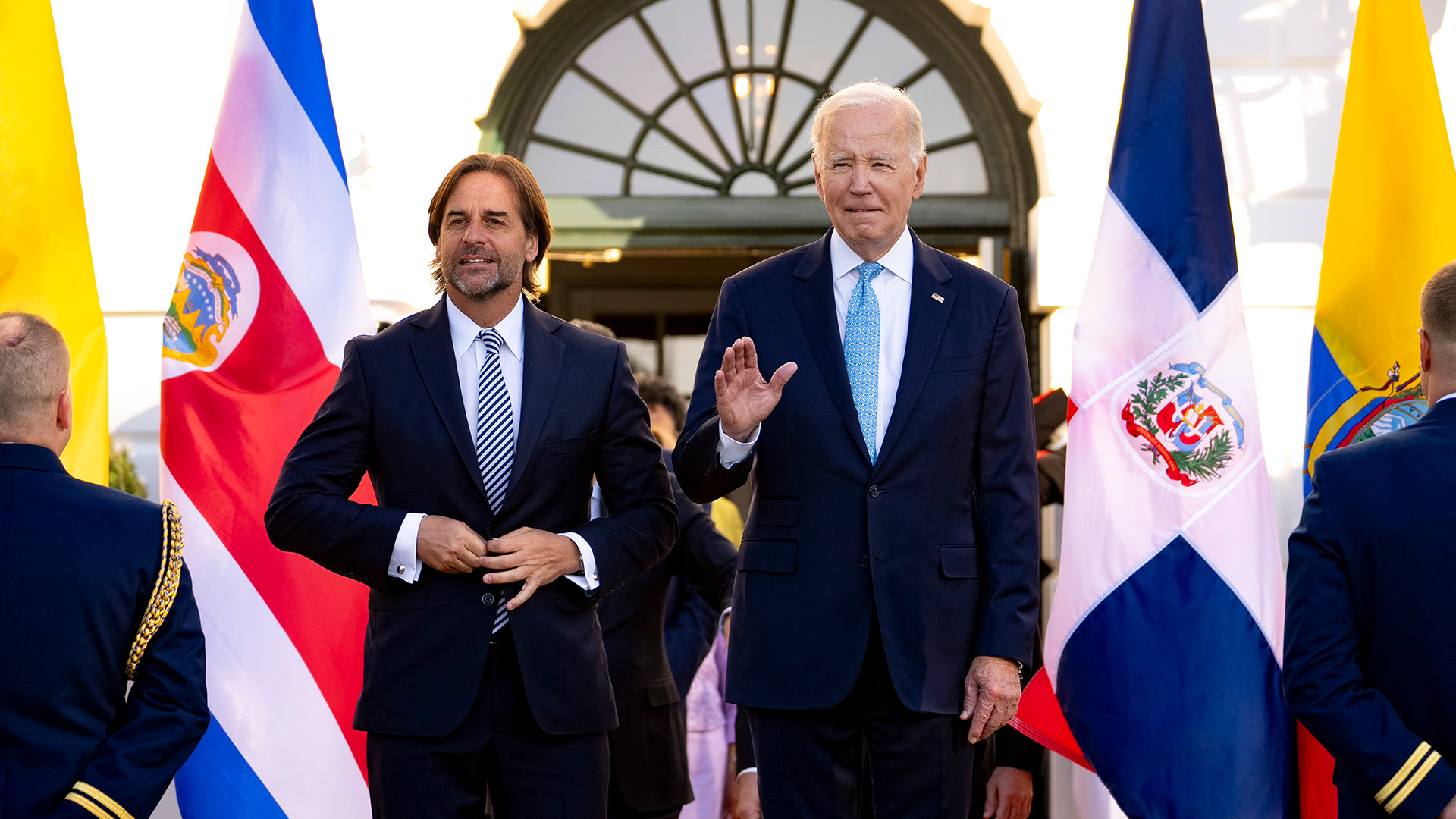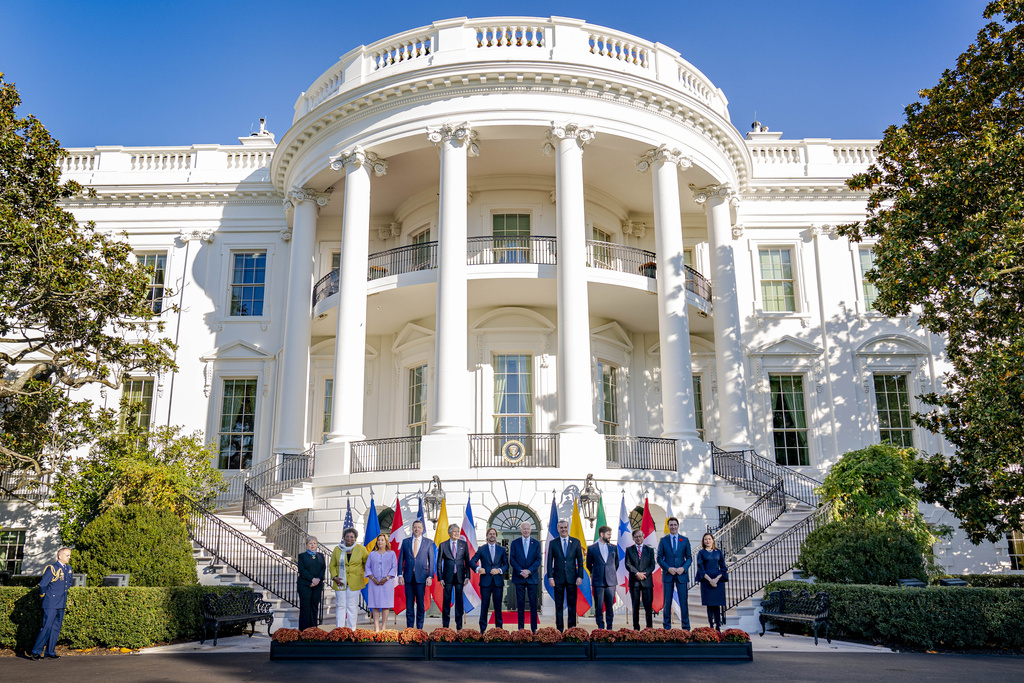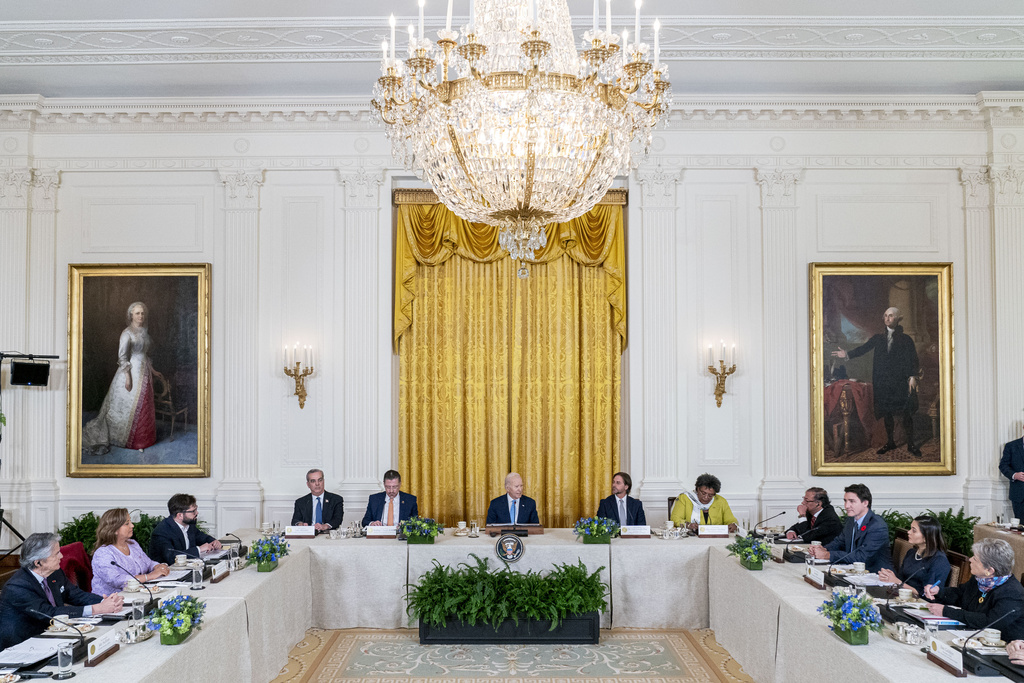
Biden hosts Americas Partnership summit focusing on migration and sustainable growth
By Lauren Taylor (Anchor), William Jackson (Producer), Zachary Hill (Video Editor)
Media Landscape
See who else is reporting on this story and which side of the political spectrum they lean. To read other sources, click on the plus signs below.
Learn more about this dataLeft 29%
Center 50%
Right 21%
Bias Distribution
Far
Left
+0
Click to close
Left
+0
Click to close
Biden will host Americas summit that focuses on supply chains, migration and new investment – Seymour Tribune
Click to see story on Associated Press News
Biden Jabs at China’s ‘Debt-Trap Diplomacy’ at Americas Summit
Click to see story on Bloomberg
Biden pledges at Americas summit an alternative to Chinese-led infrastructure and development loans
Click to see story on El Pais
Immigration overshadows Biden visit with Latin American leaders
Click to see story on Politico
Biden will host Americas summit that focuses on supply chains, migration and new investment – WSVN 7News | Miami News, Weather, Sports
Click to see story on WSVN
Biden pledges to boost regional trade before leaders of the Americas
Click to see story on Merco Press
Trudeau meets Biden in D.C. as leaders gather for trade summit – Kitimat Northern Sentinel
Click to see story on Kitimat Northern Sentinel
Trudeau meets Biden in D.C. as leaders gather for trade summit – Smithers Interior News
Click to see story on interior-news.com
Trudeau meets Biden in D.C. as leaders gather for trade summit – Houston Today
Click to see story on houston-today.com
Trudeau meets Biden in D.C. as leaders gather for trade summit – Vanderhoof Omineca Express
Click to see story on ominecaexpress.com
Trudeau meets Biden in D.C. as leaders gather for trade summit – Caledonia Courier
Click to see story on caledoniacourier.com
Click to close
Biden will host Americas summit that focuses on supply chains, migration and new investment
Click to see story on KRDO
Biden will host Americas summit that focuses on supply chains, migration and new investment
Click to see story on KIFI
Biden will host Americas summit that focuses on supply chains, migration and new investment
Click to see story on KVIA
Biden to Host Inaugural Americas Economic Summit
Click to see story on VOA News
Biden touts economic future, immigration changes in Western Hemisphere meeting
Click to see story on UPI
‘Debt-trap diplomacy’: Joe Biden offer alternative to Chinese development loans during Americas Summit
Click to see story on Live Mint
Biden will host Americas summit that focuses on supply chains, migration and new investment
Click to see story on News 4 JAX
Biden will host Americas summit that focuses on supply chains, migration and new investment
Click to see story on WPLG
With an eye toward China, Biden to meet Latin leaders on economics, migration
Click to see story on The Print
Biden will host Americas summit that focuses on supply chains, migration and new investment
Click to see story on WKMG
Biden will host Americas summit that focuses on supply chains, migration and new investment
Click to see story on Click on Detroit
Biden will host Americas summit that focuses on supply chains, migration and new investment
Click to see story on Washington Top News
Biden will host Americas summit that focuses on supply chains, migration and new investment
Click to see story on Devdiscourse
Biden will host Americas summit that focuses on supply chains, migration and new investment
Click to see story on KOB 4
Biden will host Americas summit that focuses on supply chains, migration and new investment
Click to see story on WRIC
Biden hosts leaders from countries across the Americas
Click to see story on NY1
Biden will host Americas summit that focuses on supply chains, migration and new investment
Click to see story on The Columbian
Biden pledges at Americas summit an alternative to Chinese-led infrastructure and development loans
Click to see story on ABC 4
Biden hosts Americas Partnership summit focusing on migration and sustainable growth
Click to see story on Straight Arrow News
Click to close
Biden pledges at Americas summit an alternative to Chinese-led infrastructure and development loans
Click to see story on Times of India
Biden pledges at Americas summit an alternative to Chinese-led infrastructure and development loans
Click to see story on Washington Times
Biden will host Americas summit that focuses on supply chains, migration and new investment
Click to see story on National Post
Biden Jabs at China’s ‘Debt-Trap Diplomacy’ at Americas Summit
Click to see story on Financial Post
With an eye toward China, Biden to meet Latin leaders on economics, migration
Click to see story on The Straits Times
Biden meets with AL leaders to discuss migration
Click to see story on reforma.com
Joe Biden advierte a América Latina de la ‘trampa de la deuda’ china
Click to see story on La Nación, Grupo Nación
Click to close
Far
Right
+0
Click to close
Untracked Bias
Biden will host Americas summit that focuses on supply chains, migration and new investment
Click to see story on My Mother Lode
Biden opens the meeting of the Alliance of the Americas for Economic Prosperity
Click to see story on Proceso
Trudeau meets Biden in D.C. as leaders gather for trade summit – Today In BC
Click to see story on Today In BC
Trudeau meets Biden in D.C. as leaders gather for trade summit – Red Deer Advocate
Click to see story on Red Deer Advocate
Trudeau meets Biden in D.C. as leaders gather for trade summit
Click to see story on Ponoka News
Biden will host Americas summit that focuses on supply chains, migration and new investment – The Morning Sun
Click to see story on communityq.com
Trudeau meets Biden in D.C. as leaders gather for trade summit – Castor Advance
Click to see story on castoradvance.com
Representantes de América Latina se reúnen con Joe Biden para impulsar la economía y frenar la migración
Click to see story on elfinancierocr.com
Click to close
46 other sources covering this story
Total News Sources
46
Leaning Left
11
Center
19
Leaning Right
8
Last Updated
9 months ago
Since taking office, President Joe Biden has faced challenges in curbing illegal immigration. To address the issue, the President met with officials from 11 other nations in the Americas on Friday, Nov. 3 to focus on shared migration challenges and building economic relationships.

The Americas Partnership for Economic Prosperity Leaders’ Summit aims to reduce dependence on China, strengthen the economies of the Western Hemisphere, and better address the needs of millions of migrants.
John Kirby, National Security Council Coordinator for Strategic Communications, stated, “Taken as a whole, this two-day summit represents a strong demonstration of the United States’ commitment to work with our partners to take advantage of this once-in-a-generation opportunity to recenter critical global supply chains in the Americas, continue to address our shared migration challenge, and build meaningful economic opportunity across the hemisphere.”
Leaders from Canada, Mexico, Chile, Colombia, the Dominican Republic, Costa Rica, Ecuador, Peru, Uruguay, Barbados and Panama were all present.
Countries across the Western Hemisphere have witnessed unprecedented waves of migrants crossing borders, with many heading towards the United States. The dangerous trek through Panama’s Darien Gap, a sprawling roadless jungle connecting South and Central America, has been a major concern for U.S. and international officials.

President Biden outlined the summit’s three-pronged migration strategy:
- Working together to stabilize migrant populations, ensuring that communities welcoming migrants and refugees can afford to support them.
- Renewing and expanding legal pathways to promote safe and orderly migration, including providing worker permits for migrants to contribute to the economy.
- Enforcing immigration laws in humane and effective ways to deter dangerous irregular migration and disrupt traffickers.
Meanwhile, the United States is still grappling with the growing immigration crisis, as cities across the country continue to receive an influx of asylum seekers from various countries. Mayors from some of the nation’s largest cities convened in Washington to request $5 billion in funding for addressing the immigration crisis.
[ANCHOR]
Since taking office, President Biden has faced challenges in curbing illegal immigration. In an effort to confront the issue, the president convened with officials from 11 other nations from the Americas Friday to concentrate on shared migration challenges and building economic relationships.
The Americas Partnership for Economic Prosperity Leaders’ Summit aims to reduce dependence on China, strengthen the economies of the Western Hemisphere and better address the needs of millions of migrants.
[JOHN KIRBY | NATIONAL SECURITY COUNCIL COORDINATOR FOR STRATEGIC COMMUNICATIONS]
Taken as a whole, this two-day summit represents a strong demonstration of the United States’ commitment to work with our partners to take advantage of this once-in-a-generation opportunity to recenter critical global supply chains in the Americas, continue to address our shared migration challenge, and build meaningful economic opportunity across the hemisphere.
[ANCHOR]
The emphasis on irregular migration arises as countries across the Western Hemisphere have witnessed unprecedented waves of migrants crossing borders — most of them making their way toward the United States.
The dangerous trek has been a concern for U.S. and international officials. Of note, Latin American countries are seeing expansive migrant travel through Panama’s Darien Gap — a sprawling roadless jungle connecting South and Central America.
President Biden elaborated on the summit’s three-pronged migration strategy.
[PRESIDENT JOE BIDEN]
Our shared approach has three key parts one working together to stabilize migrant populations, including making sure the communities that are welcoming migrants and refugees can afford can afford to welcome them and afford to care for them.
Secondly, renewing and expanding legal pathways to promise to promote safe and orderly migration. Providing worker permits to allow migrants to contribute to our economy.
And three, enforcing our immigration laws and humane and effective ways to deter that deters dangerous irregular migration and disrupts traffickers.
[ANCHOR]
Meanwhile, the United States is still battling the growing crisis.
Cities across the U.S. continue to experience an influx of asylum seekers from various countries. Recently, majors from some of the nation’s largest cities met in Washington to request five billion dollars in funding for addressing the immigration crisis.
Media Landscape
See who else is reporting on this story and which side of the political spectrum they lean. To read other sources, click on the plus signs below.
Learn more about this dataLeft 29%
Center 50%
Right 21%
Bias Distribution
Far
Left
+0
Click to close
Left
+0
Click to close
Biden will host Americas summit that focuses on supply chains, migration and new investment – Seymour Tribune
Click to see story on Associated Press News
Biden Jabs at China’s ‘Debt-Trap Diplomacy’ at Americas Summit
Click to see story on Bloomberg
Biden pledges at Americas summit an alternative to Chinese-led infrastructure and development loans
Click to see story on El Pais
Immigration overshadows Biden visit with Latin American leaders
Click to see story on Politico
Biden will host Americas summit that focuses on supply chains, migration and new investment – WSVN 7News | Miami News, Weather, Sports
Click to see story on WSVN
Biden pledges to boost regional trade before leaders of the Americas
Click to see story on Merco Press
Trudeau meets Biden in D.C. as leaders gather for trade summit – Kitimat Northern Sentinel
Click to see story on Kitimat Northern Sentinel
Trudeau meets Biden in D.C. as leaders gather for trade summit – Smithers Interior News
Click to see story on interior-news.com
Trudeau meets Biden in D.C. as leaders gather for trade summit – Houston Today
Click to see story on houston-today.com
Trudeau meets Biden in D.C. as leaders gather for trade summit – Vanderhoof Omineca Express
Click to see story on ominecaexpress.com
Trudeau meets Biden in D.C. as leaders gather for trade summit – Caledonia Courier
Click to see story on caledoniacourier.com
Click to close
Biden will host Americas summit that focuses on supply chains, migration and new investment
Click to see story on KRDO
Biden will host Americas summit that focuses on supply chains, migration and new investment
Click to see story on KIFI
Biden will host Americas summit that focuses on supply chains, migration and new investment
Click to see story on KVIA
Biden to Host Inaugural Americas Economic Summit
Click to see story on VOA News
Biden touts economic future, immigration changes in Western Hemisphere meeting
Click to see story on UPI
‘Debt-trap diplomacy’: Joe Biden offer alternative to Chinese development loans during Americas Summit
Click to see story on Live Mint
Biden will host Americas summit that focuses on supply chains, migration and new investment
Click to see story on News 4 JAX
Biden will host Americas summit that focuses on supply chains, migration and new investment
Click to see story on WPLG
With an eye toward China, Biden to meet Latin leaders on economics, migration
Click to see story on The Print
Biden will host Americas summit that focuses on supply chains, migration and new investment
Click to see story on WKMG
Biden will host Americas summit that focuses on supply chains, migration and new investment
Click to see story on Click on Detroit
Biden will host Americas summit that focuses on supply chains, migration and new investment
Click to see story on Washington Top News
Biden will host Americas summit that focuses on supply chains, migration and new investment
Click to see story on Devdiscourse
Biden will host Americas summit that focuses on supply chains, migration and new investment
Click to see story on KOB 4
Biden will host Americas summit that focuses on supply chains, migration and new investment
Click to see story on WRIC
Biden hosts leaders from countries across the Americas
Click to see story on NY1
Biden will host Americas summit that focuses on supply chains, migration and new investment
Click to see story on The Columbian
Biden pledges at Americas summit an alternative to Chinese-led infrastructure and development loans
Click to see story on ABC 4
Biden hosts Americas Partnership summit focusing on migration and sustainable growth
Click to see story on Straight Arrow News
Click to close
Biden pledges at Americas summit an alternative to Chinese-led infrastructure and development loans
Click to see story on Times of India
Biden pledges at Americas summit an alternative to Chinese-led infrastructure and development loans
Click to see story on Washington Times
Biden will host Americas summit that focuses on supply chains, migration and new investment
Click to see story on National Post
Biden Jabs at China’s ‘Debt-Trap Diplomacy’ at Americas Summit
Click to see story on Financial Post
With an eye toward China, Biden to meet Latin leaders on economics, migration
Click to see story on The Straits Times
Biden meets with AL leaders to discuss migration
Click to see story on reforma.com
Joe Biden advierte a América Latina de la ‘trampa de la deuda’ china
Click to see story on La Nación, Grupo Nación
Click to close
Far
Right
+0
Click to close
Untracked Bias
Biden will host Americas summit that focuses on supply chains, migration and new investment
Click to see story on My Mother Lode
Biden opens the meeting of the Alliance of the Americas for Economic Prosperity
Click to see story on Proceso
Trudeau meets Biden in D.C. as leaders gather for trade summit – Today In BC
Click to see story on Today In BC
Trudeau meets Biden in D.C. as leaders gather for trade summit – Red Deer Advocate
Click to see story on Red Deer Advocate
Trudeau meets Biden in D.C. as leaders gather for trade summit
Click to see story on Ponoka News
Biden will host Americas summit that focuses on supply chains, migration and new investment – The Morning Sun
Click to see story on communityq.com
Trudeau meets Biden in D.C. as leaders gather for trade summit – Castor Advance
Click to see story on castoradvance.com
Representantes de América Latina se reúnen con Joe Biden para impulsar la economía y frenar la migración
Click to see story on elfinancierocr.com
Click to close
46 other sources covering this story
Total News Sources
46
Leaning Left
11
Center
19
Leaning Right
8
Last Updated
9 months ago
Unbiased news.
Directly to
your inbox.
Free!
MOST POPULAR
-
 U.S. Department of Defense
U.S. Department of Defense
Congress still trying to figure out how to reduce wasteful military spending
Watch 2:29
6 hrs ago
-
 DVIDS
DVIDS
US Navy, Air Force making waves with new weapons at RIMPAC
Watch 6:03
7 hrs ago
-
 Getty Images
Getty Images
Israeli PM Netanyahu meets with Trump at Mar-a-Lago
Watch 2:54
7 hrs ago
-
 Getty Images
Getty Images
Growing US nuclear power resurgence reaches the nation’s heartland
Watch 1:19
7 hrs ago
